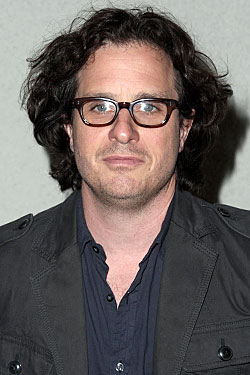
For his first long-form return to the documentary format since the Oscar-winning An Inconvenient Truth, Davis Guggenheim cranked his amp and convened a real-life guitar hero summit. It Might Get Loud brings together Jimmy Page, Jack White, and the Edge, letting the ax men tell stories of their bands, songs, and upbringings. Vulture met up with Guggenheim at the Beverly Hills Hotel to talk about his doc, Guitar Hero, and the mystery of music.
You filmed this over the course of more than a year. What was the editing process like?
WhatÔÇÖs great is that over the last ten years, Michael Moore and Errol Morris completely shattered the formula [for making documentaries], and now you can do almost anything. This movie started with sit-down interviews in hotel rooms and studios, and IÔÇÖd come home with eight hours of audio on these guys, and cut that down. So before I even rolled a frame of film, I had a really strong sense of where the movie was going to go.
Did you ever feel like you were chasing an element of creative expression that couldnÔÇÖt be explained?
ThatÔÇÖs something I sometimes struggled with. Often people write about music in incredibly interesting and evocative ways. At the same time, the most interesting things about good bands are often the things that you can feel, but are unspoken ÔÇö the vibrations that are almost indescribable. That was the challenge of the movie ÔÇö how to describe the contribution of these guys.
The film interweaves three discrete biographical stories around some shared jam sessions. How much of the latter was planned out?
It was two days of talking and playing music. I didnÔÇÖt give them any questions or preparation. The only thing I said was that there are three or four seminal songs that keep coming up, and if you want to talk about that stuff, great. And I insisted that they not meet each other beforehand. I didnÔÇÖt know whether they would talk the whole time, or get along. I was hoping theyÔÇÖd play music, but I didnÔÇÖt want to ask them.
Each of the three guitarists in the film has a certain mythology about them. Was it hard to penetrate the mystique?
Well, I donÔÇÖt want to describe or judge them, but they clearly are personas, and part of it is a healthy, mysterious game that rock stars have ÔÇö you donÔÇÖt want to take your date out and have the night of your life falling in love to see a guy or girl who looks like you, you want someone to tell you a story and put on a personality. I think thereÔÇÖs a little tension in the movie because weÔÇÖre trying to break through that a little bit. Each one of them has some desire to tell their real story, but their discipline is to still keep up the mystique.
What are your feelings on the Guitar Hero?
ThereÔÇÖs a battle in my household over video games. We win some and lose some, but the battle I will never lose is whether Guitar Hero is in the house or not. Not that I think itÔÇÖs a bad game, but if my son is going to spend 100 hours holding something that looks like a guitar, heÔÇÖd better spend those 100 hours learning how to play guitar. IÔÇÖve played it, itÔÇÖs a fun game, but I donÔÇÖt like it for my son. Guitar comes from obsession ÔÇö the need to try to say something, and get it just right. A video game that takes all that energy, sucks your individual creativity into this video space, and makes it a competition, I think is kind of sad.

